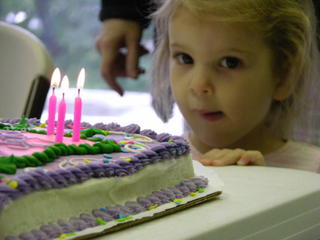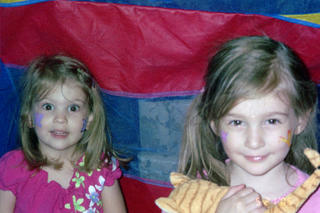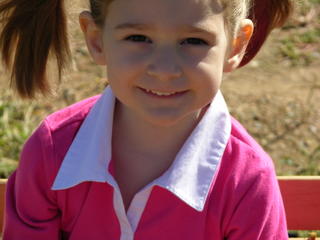It's for the Kids
 Look at that faaace! How could you not want to minister to hur?
Look at that faaace! How could you not want to minister to hur?Earlier this summer the difficulty of ministering to both adults and children in small groups became apparent at Christ Journey, and ever since we have been brainstorming about how to best meet the needs to both age ranges. This morning I attended a couple of classes on this very topic at ACU's Summer Workshop for small churches.
One class told about a new thing called the Workshop Rotation Model (WoRM). It is something that (if slightly adapted) Christ Journey could do in one room of the house for the kids while the adults are engaged in discussion about the week's lesson in the other room. Here is a description of WoRM from a website that I recommend if you want to learn more and/or download curricula for free, rotation.org:
Teach major Bible stories and concepts through kid-friendly multimedia workshops: an Art workshop, Drama, Music, Games, A-V, Puppets, Storytelling, Computers, and any other educational media you can get your hands on. Teach the same Bible story in all of the workshops for four or five weeks rotating the kids to a different workshop each week. And here comes the extremely teacher friendly part: Keep the same teacher in each workshop for all five weeks -teaching the same lesson week after week (with some age appropriate adjustments) to each new class coming in. The results, says Linda Beckham, D.C.E. at Tampa's Palma Ceia Church are astounding. "The kids love it, the teachers love it, and we can't ever imagine going back to the old way."
And for another perspective, here's a description from another recommended site, PowerXpress.com:
In a rotational setting, the same Bible story or theme is taught for several weeks. Each week, learners rotate to a different station. The story remains the same, but children encounter it in different ways in each station. Repetition is an important part of the rotation approach. The more different ways children explore a story or concept, the more it is reinforced in their memories. The variety of experiences keeps interest high throughout the unit. Teachers teach the same lesson, with age-level adjustments, for the length of the rotation. Rotational learning is exciting for students and teachers alike, as teachers teach to their strengths and students experience Bible stories in ways they learn best. Rotational learning is grounded in the work of Howard Gardner in Multiple Intelligences Theory. Rotational learning is active learning, emphasizing each of the first seven intelligences that Gardner identified. Rotational learning is an extremely flexible model that adapts well to many settings.
 I think it would be very easy for Christ Journey (as well as Team Olomouc) to adapt this for their small group ministry. When praise time is over and it is time for the lesson, an adult (a different one each week) could take the kids to another room and use her/his talents and interests to teach the children the lesson. Perhaps the same story could be taught four weeks in a row from four different angles (arts, crafts, science, cooking, movies, computers, games, music, drama, story-telling, puppets). By the way, apparently repitition is good for small children (pre-K to 3rd grade). So, though studying the same story four weeks in a row could be monotonous for us, it won't necessarily be for the kids. This model sounds cool to me, and, like I recently wrote about, it might be a way for me to use my interest in art to teach kids. Two other benefits are that more adults get to be involved in the lives of the small group's children and no one adult has to carry the whole load.
I think it would be very easy for Christ Journey (as well as Team Olomouc) to adapt this for their small group ministry. When praise time is over and it is time for the lesson, an adult (a different one each week) could take the kids to another room and use her/his talents and interests to teach the children the lesson. Perhaps the same story could be taught four weeks in a row from four different angles (arts, crafts, science, cooking, movies, computers, games, music, drama, story-telling, puppets). By the way, apparently repitition is good for small children (pre-K to 3rd grade). So, though studying the same story four weeks in a row could be monotonous for us, it won't necessarily be for the kids. This model sounds cool to me, and, like I recently wrote about, it might be a way for me to use my interest in art to teach kids. Two other benefits are that more adults get to be involved in the lives of the small group's children and no one adult has to carry the whole load. The other class I attended also dealt with the simultaneous problem and opportunity of ministering to children in small groups. Here are a couple of links from the speaker's church's website (Alameda Church of Christ). One is on the ins and outs of small groups and the other has discussion guides available to download. Each guide includes a 'kid friendly' lesson. There is also a document available which is full of lessons for preschoolers in small groups.
The other class I attended also dealt with the simultaneous problem and opportunity of ministering to children in small groups. Here are a couple of links from the speaker's church's website (Alameda Church of Christ). One is on the ins and outs of small groups and the other has discussion guides available to download. Each guide includes a 'kid friendly' lesson. There is also a document available which is full of lessons for preschoolers in small groups.Download discussion guides here.
Find information on how to do small group ministry and other tools here.
Ain't the internet great!
The heartwarming pictures you've been enjoying are of my two neices, Reagan and Jayden. Aww.




0 Comments:
Post a Comment
<< Home